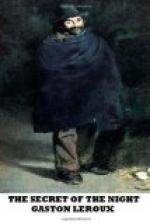[The “Barque” is a restaurant on a boat, among the isles, near the Gulf of Finland, on a bank of the Neva.]
These last graceful words were addressed to Madame Trebassof, who shrugged her shoulders at the undesired gallantry of the gay Councilor. She did not join in the conversation, excepting to calm the general, who wished to send the whole regiment to the guard-house, men and horses. And while the roisterers laughed over the adventure she said to her husband in the advisory voice of the helpful wife:
“Feodor, you must not attach importance to what that old fool Ivan tells you. He is the most imaginative man in the capital when he has had champagne.”
“Ivan, you certainly have not had horses served with champagne in pails,” the old boaster, Athanase Georgevitch, protested jealously. He was an advocate, well-known for his table-feats, who claimed the hardest drinking reputation of any man in the capital, and he regretted not to have invented that tale.
“On my word! And the best brands! I had won four thousand roubles. I left the little fete with fifteen kopecks.”
Matrena Petrovna was listening to Ermolai, the faithful country servant who wore always, even here in the city, his habit of fresh nankeen, his black leather belt, his large blue pantaloons and his boots glistening like ice, his country costume in his master’s city home. Madame Matrena rose, after lightly stroking the hair of her step-daughter Natacha, whose eyes followed her to the door, indifferent apparently to the tender manifestations of her father’s orderly, the soldier-poet, Boris Mourazoff, who had written beautiful verses on the death of the Moscow students, after having shot them, in the way of duty, on their barricades.




